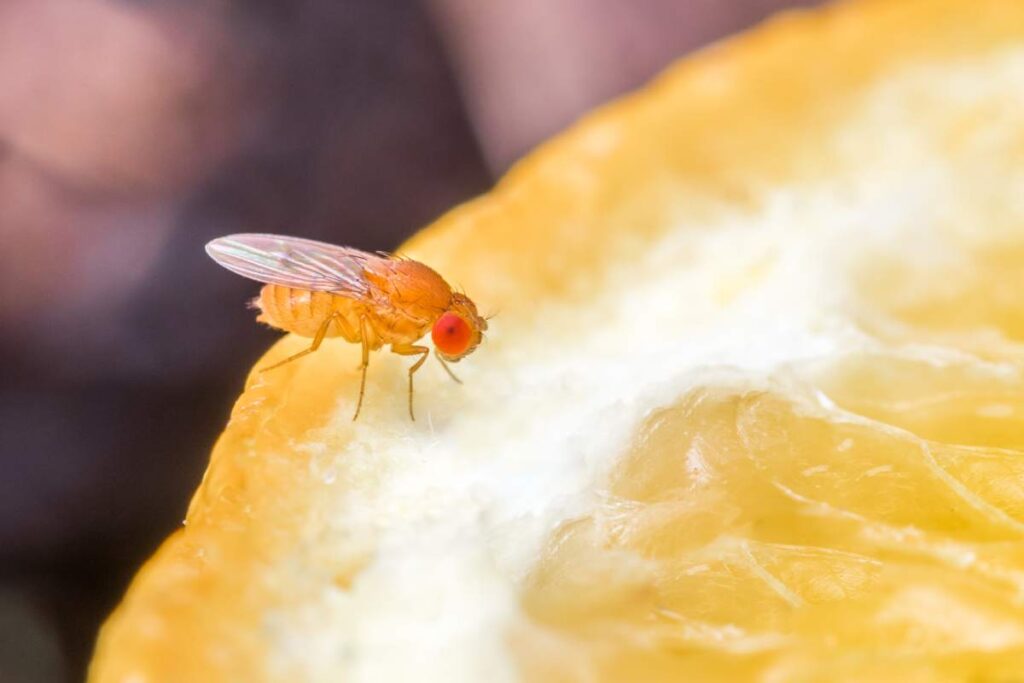Why Do I Suddenly Have Fruit Flies? How Harmful Are They, and How Do I Get Rid of Them in My House?
Fruit flies are tiny pests that seem to appear out of nowhere, often hovering around overripe fruit, sinks, and garbage cans. While they are small, their presence can be quite bothersome and make us wonder how they got there in the first place.
This article dives into the reasons why fruit flies suddenly invade our homes, examines whether they pose any harm, and provides effective methods for eliminating them.
Why Do Fruit Flies Suddenly Appear?
Fruit flies are incredibly efficient at finding food sources and can appear in a home quickly due to their keen sense of smell and ability to lay hundreds of eggs. They are attracted primarily to fermenting organic material, particularly fruits and vegetables that are overripe or decaying. Here are some common reasons why you might suddenly notice fruit flies in your home:
- Overripe or Rotting Fruit: Fruit flies are attracted to the sugars in ripe or decaying fruit. Even a small piece of fruit left out on the counter can attract them.
- Food Residue in Drains and Garbage Disposals: Fruit flies can breed in moist, organic materials, making kitchen drains a prime location if they aren’t regularly cleaned.
- Garbage and Recycling Bins: Any remnants of food, juice, or liquid in trash and recycling bins can attract fruit flies. If bins aren’t tightly sealed or emptied often, they provide an easy feeding ground.
- Forgotten Leftovers or Spills: Even small spills of juice, wine, or other sugary liquids that go unnoticed can attract fruit flies.
- Poorly Stored Food: Fruit flies can infiltrate loosely covered food items in pantries or cabinets, especially fruits and vegetables not stored in airtight containers.
- Indoor Plants: Although not as common, some potted plants with damp soil or decaying organic matter can also attract fruit flies if there is decaying matter or a damp, organic environment.
These factors make kitchens and pantries the most common areas for fruit fly infestations. Once they find a suitable environment, they reproduce rapidly, making it seem like they appeared overnight.

How Harmful Are Fruit Flies?
While fruit flies may not bite or sting, they can still pose risks to health and hygiene. Here’s a breakdown of their potential harm:
- Contamination: Fruit flies are known to pick up and spread bacteria from one surface to another. Since they often hover around decaying food and garbage, they can carry pathogens that might contaminate your food or kitchen surfaces.
- Food Spoilage: Fruit flies lay eggs on or near food, and the resulting larvae feed on it, accelerating food spoilage. This can be especially concerning in households where fresh produce is kept on countertops.
- Bacteria and Germs: Research has shown that fruit flies can carry harmful bacteria, such as E. coli, Salmonella, and Listeria. When they land on food or kitchen utensils, they can potentially transfer these germs.
- Trigger for Allergies or Respiratory Issues: For people who have allergies or respiratory issues, the presence of fruit flies might worsen their symptoms. The debris from fruit fly bodies, such as shed skins and waste, could potentially aggravate certain allergies.
Although they are not as harmful as other pests like cockroaches, their presence can still compromise food safety and cleanliness. Therefore, it’s best to tackle a fruit fly infestation quickly to avoid these potential risks.
How to Get Rid of Fruit Flies in Your House
Fruit flies are resilient, but there are several effective strategies to eliminate them from your home. Here are the most successful ways to tackle a fruit fly problem:
1. Identify and Eliminate Attractants
The first step in getting rid of fruit flies is to remove what’s attracting them. Dispose of overripe fruits, check for forgotten food items in the pantry, and clean up any spills or residues, especially in the kitchen and dining areas.
- Refrigerate Produce: Store produce in the refrigerator to make it less accessible to fruit flies.
- Use Airtight Containers: Place all food items in sealed containers to prevent fruit flies from laying eggs.
- Take Out the Trash: Dispose of garbage regularly, especially if it contains food waste or items that can rot.
2. Clean Drains and Garbage Disposals
Since drains are common breeding grounds for fruit flies, a thorough cleaning is essential.
- Boiling Water: Pour boiling water down the drain daily to kill any eggs or larvae.
- Drain Cleaner: Use a commercial drain cleaner or a natural mixture of vinegar and baking soda to clear food residue.
3. Make Simple Fruit Fly Traps
Homemade traps are highly effective and can be easily created with items you likely already have in the house. Here are a few popular traps:
- Vinegar and Dish Soap Trap: Fill a small bowl with apple cider vinegar and add a few drops of dish soap. The vinegar attracts the fruit flies, and the dish soap prevents them from escaping.
- Jar Trap with Plastic Wrap: Place a piece of overripe fruit or vinegar in a jar and cover the opening with plastic wrap. Poke a few small holes in the plastic wrap; fruit flies will enter the jar but won’t be able to escape.
- Wine or Beer Trap: Similar to vinegar, fruit flies are attracted to the fermented smell of wine and beer. Leaving a small amount of wine or beer in a bottle with a narrow neck can also work as a trap.

4. Use a Store-Bought Trap or Spray
If the DIY traps don’t do the job, there are commercial fruit fly traps and sprays available. These can be especially helpful if the infestation is large or persistent.
- Sticky Traps: Some traps use sticky surfaces that attract and trap fruit flies.
- Natural Insect Sprays: Consider using insect sprays with natural ingredients that are safe for indoor use, especially around food areas.
If these efforts still don’t eliminate the fruit flies, calling Expert Pest Control can provide a more robust solution. Their professionals specialize in targeting and eradicating household pests, including fruit flies, using safe and effective treatments that help prevent future infestations.
5. Improve Air Circulation
Fruit flies prefer damp, stagnant air. By increasing air circulation in your home, you can make it less inviting for them.
- Turn on Fans: Place fans in areas where you’ve noticed fruit flies to create air movement, making it harder for them to hover.
- Open Windows: If possible, open windows to help fresh air circulate, which can discourage fruit flies from lingering indoors.
6. Maintain a Regular Cleaning Routine
A clean kitchen is one of the best ways to prevent fruit flies from coming back. Make it a habit to:
- Wipe Down Surfaces: Clean countertops, cutting boards, and other surfaces daily to eliminate crumbs and spills.
- Empty the Trash Frequently: Even small food remnants in the trash can attract fruit flies.
- Check Hidden Areas: Look for forgotten items in pantries, behind appliances, and other hidden spots where fruit flies could thrive.
Preventing Future Fruit Fly Infestations
Once you’ve rid your home of fruit flies, taking preventive measures will help keep them from returning:
- Store Produce Properly: Refrigerate fruits and vegetables when possible, or cover them tightly if they’re left on the counter.
- Regular Drain Maintenance: Even if you don’t have fruit flies now, it’s good practice to clean your drains monthly to remove any residue that could attract them.
- Routine Garbage Disposal: Keep trash cans clean and lined, and make sure they are emptied regularly.
Conclusion
Fruit flies may be tiny, but their presence can disrupt the cleanliness and comfort of your home. Understanding why they appear, the potential harm they can cause, and effective ways to eliminate them will help you tackle the issue promptly. By following these prevention tips and keeping your kitchen and food storage areas clean, you can ensure a fruit fly-free home year-round.














Post Comment